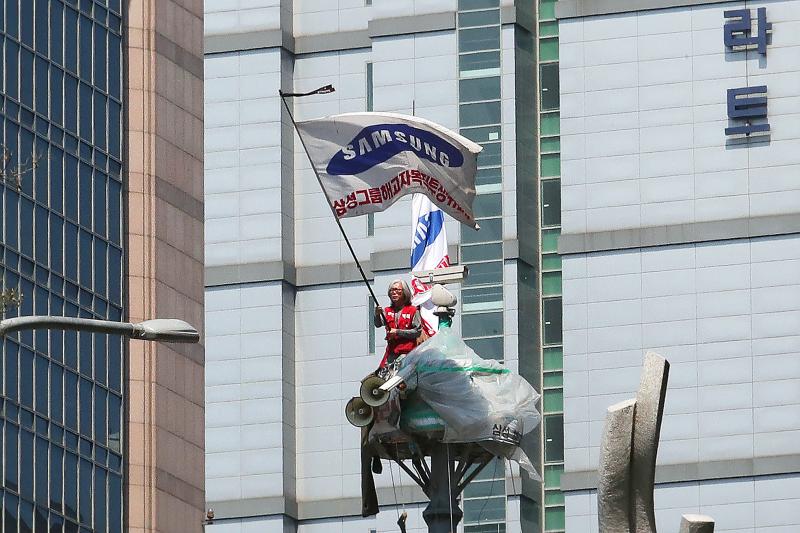Samsung Group heir Jay Y. Lee, embroiled in a bribery scandal, yesterday apologized over controversial succession plans and said he would not hand over management rights to his children at the family-controlled conglomerate.
In his first news conference in five years, Lee, 51, expressed regret for the group’s failure to strictly abide by the law and ethics.
The vice chairman of Samsung Electronics Co has been embroiled in a bribery scandal involving South Korea’s impeached president and which prosecutors said was aimed at smoothing business succession.

Photo: AP
“Samsung failed to live up to public expectations. We have caused disappointments and concerns,” Lee said at a Samsung office in Seoul.
He also apologized for the behavior of executives caught sabotaging labor union activities.
The South Korean Supreme Court in August last year overturned an appeals court ruling on the bribery case, raising the possibility of a tougher sentence and potential return to jail for the head of the nation’s biggest conglomerate.
Some of Samsung Group’s former and current executives have been investigated or convicted in other cases. For example, then-board chairman of Samsung Electronics Lee Sang-hoon was jailed in December last year for sabotaging union activities. He has since resigned and lodged an appeal.
Jay Y. Lee said he would not handover management powers to his children.
“I’m thinking of not passing on management rights to my children. I have been keeping that thought to myself, as I was reluctant to make it public,” he said.

SEEKING CLARITY: Washington should not adopt measures that create uncertainties for ‘existing semiconductor investments,’ TSMC said referring to its US$165 billion in the US Taiwan Semiconductor Manufacturing Co (TSMC, 台積電) told the US that any future tariffs on Taiwanese semiconductors could reduce demand for chips and derail its pledge to increase its investment in Arizona. “New import restrictions could jeopardize current US leadership in the competitive technology industry and create uncertainties for many committed semiconductor capital projects in the US, including TSMC Arizona’s significant investment plan in Phoenix,” the chipmaker wrote in a letter to the US Department of Commerce. TSMC issued the warning in response to a solicitation for comments by the department on a possible tariff on semiconductor imports by US President Donald Trump’s

The government has launched a three-pronged strategy to attract local and international talent, aiming to position Taiwan as a new global hub following Nvidia Corp’s announcement that it has chosen Taipei as the site of its Taiwan headquarters. Nvidia cofounder and CEO Jensen Huang (黃仁勳) on Monday last week announced during his keynote speech at the Computex trade show in Taipei that the Nvidia Constellation, the company’s planned Taiwan headquarters, would be located in the Beitou-Shilin Technology Park (北投士林科技園區) in Taipei. Huang’s decision to establish a base in Taiwan is “primarily due to Taiwan’s talent pool and its strength in the semiconductor

An earnings report from semiconductor giant and artificial intelligence (AI) bellwether Nvidia Corp takes center stage for Wall Street this week, as stocks hit a speed bump of worries over US federal deficits driving up Treasury yields. US equities pulled back last week after a torrid rally, as investors turned their attention to tax and spending legislation poised to swell the US government’s US$36 trillion in debt. Long-dated US Treasury yields rose amid the fiscal worries, with the 30-year yield topping 5 percent and hitting its highest level since late 2023. Stocks were dealt another blow on Friday when US President Donald

UNCERTAINTY: Investors remain worried that trade negotiations with Washington could go poorly, given Trump’s inconsistency on tariffs in his second term, experts said The consumer confidence index this month fell for a ninth consecutive month to its lowest level in 13 months, as global trade uncertainties and tariff risks cloud Taiwan’s economic outlook, a survey released yesterday by National Central University found. The biggest decline came from the timing for stock investments, which plunged 11.82 points to 26.82, underscoring bleak investor confidence, it said. “Although the TAIEX reclaimed the 21,000-point mark after the US and China agreed to bury the hatchet for 90 days, investors remain worried that the situation would turn sour later,” said Dachrahn Wu (吳大任), director of the university’s Research Center for